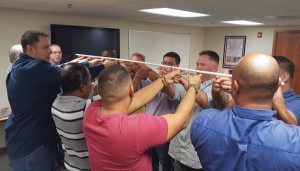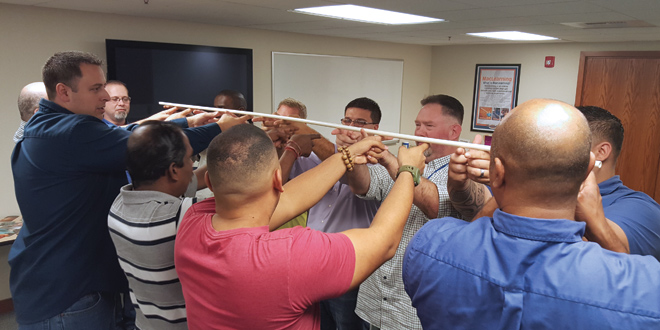To view a PDF of this story, click here and download a resource that will help you determine what training program fits your store’s budget.
By: Liz Lichtenberger llichtenberger@nrha.org, Kate Klein kklein@nrha.org and Scott Wright swright@nrha.org.
The topic of leadership development has never been an easy one to address. For one, it’s very subjective. Everyone has a different definition of leadership and a different take on the qualities good leaders should possess. We’ve all worked with good leaders as well as poor ones. And both types have shaped, on a very personal level, our opinions of what leadership should look like.
So how do you identify and develop good retail leaders?
First, let’s look at the characteristics of a leader. A strong leader is one who can communicate well, who accepts or even asks for constructive criticism, who can think on his or her feet and who can be flexible about different, and sometimes difficult, situations. It’s important for strong leaders to be patient, humble and responsible as well.
Many experts and leadership gurus believe the best way to learn about leadership is by learning from real-life leaders. That’s why sites like TED Talks and Leadercast have millions of regular viewers.
Hardware Retailing and the North American Retail Hardware Association (NRHA) Retail Leadership Institute recently conducted a series of interviews with four up-and-coming retail leaders in our industry. All four have been through NRHA’s Retail Management Certification Program and have recently been promoted to new leadership roles within their respective companies. Each is now responsible for grooming the next generation of leaders in their organizations. And each has a different style and approach to the subject of leadership.
While leadership is not a subject that’s easily dissected, it is a topic with real implications for the continued growth of our industry. In recent surveys conducted by NRHA and Hardware Retailing and presented at the NRHA State of Independents Conference in December, retailers reported the biggest challenge to both their short- and long-term growth is finding the right employees. If finding good employees for any position is a challenge, then finding future leaders to step up and run your stores will be even harder.
Continued industry growth and success in the face of new and existing challenges will require identifying capable leaders at all levels within stores, and then grooming them to reach their full potential. We’ll offer you the following information below:
- Excerpts of interviews from four industry leaders.
- More about two best-in-class management-in-training programs from two independent hardware retailing operations.
- Steps to take next to help your potential leaders start management training, and some other leadership tips and resources.
Leading By Example

Tyler Russom
District Manager
Buchheit Enterprises
Eight Large-Format Farm Stores/Home Centers Located in Southeastern Missouri and Western Illinois
Tyler Russom is a no-nonsense leader. He cut his leadership teeth working for Lowe’s, going through its management/leadership training rigors. This is where he learned about leadership by example—both good and bad. After leaving Lowe’s, he found his “second home” working with the Buchheit family, managing one of its large-format farm and home stores in Jackson, Missouri.
Russom earned his stripes managing that store in a “trial-by-fire” situation, and recalls a defining moment of his career after an ice storm ravaged the community in 2009. “I stayed at that store from 7 a.m. to midnight for days, keeping it open late so customers could come in and get what they needed. It was a huge boost to the community, and by owning a trucking company, the Buchheits were able to bring in needed supplies other retailers couldn’t.”
Russom rallied the troops, demonstrating leadership skills the family took note of. “The whole team was on board 100 percent, and nobody minded working until midnight. I think that’s when the Buchheit family realized I had the commitment to do what was needed without being asked or told.”
After graduating from the Summer 2013 RMCP class with honors, Russom was promoted to district manager, where he continues to lead by example and represent the company name with pride.
Read more from Russom here.
Recognizing Potential
I’ve always been pretty good at recognizing potential in people. But I’ve made some mistakes along the way and have pushed people above what their skill level is and set them up to fail. That’s the biggest injustice you can do to someone—push them above their skill level, and then they fail. When they fail, you fail.
Leading by Example
What I abide by is trying to lead by example and be a good influence, both at work and away from work. I feel like I can inspire people. I feel like I can manage anyone and different personality types, because I can adapt to different people.
Recruiting
You rarely get a good candidate who walks in the front door. You have to find them. I think we’re doing a better job recruiting people today than in the past.
Building the Team

Christian Herrick
Vice President of Retail Operations
Randy’s Do it Best Hardware
Two stores based in Timberville, Virginia
It wasn’t always a given that Christian Herrick would have a career in retail. What was a given, however, is that he would be a leader in whatever career he chose.
Herrick’s leadership journey has covered a lot of territory, taking him from missionary work in Alaska to a service manager job in Las Vegas. When he and his wife Rachel returned to her home in Timberville, Virginia, after the birth of their first child, Christian took a job as a merchandiser in her dad’s hardware store, Randy’s Do It Best Hardware. And the rest, as they say, is history.
Christian fell in love with hardware retailing and quickly established himself as a leader within the organization. In 2011, after a few years of talking with owners Randy and Shirley Andes, Christian would open a third store in Bridgewater, Virginia, and would take a leadership role in opening it and getting it established by developing and coaching his own leadership team.
Today, Christian is vice president of retail operations for the business, which, through his efforts, has experienced double-digit growth. He has brought an open communication style and fresh ideas, and is currently preparing for a Super Walmart to open across the street from the Timberville location this summer. That was the focus of his business improvement project for the Spring 2015 RMCP class.
Read more from Herrick here.
Painting the Vision
I have painted a clear vision of a career path for [my employees], and they have all bought solidly into it. I saw a lot of potential in each of them and how they fit into the business. They didn’t envision a career in hardware retailing, but now they all have a clear idea of making a career of this business.
Hire for Attitude
I’ve tried it both ways … hiring for attitude and hiring for skills. People who are experienced—tradesmen or salespeople—really haven’t worked out. None of them. The ones who succeed are hard-working, friendly people, regardless of their experience.
Plenty of Leeway
With potential leaders, give them leeway and let them excel and make mistakes. One thing that’s been helpful to my development as a leader is [owners] Randy and Shirley have always let me try new things and made me feel like the sky is the limit.
A Diamond in the Rough

Josiah Gates
Vice President of Retail Innovation
Aubuchon Hardware
110 Stores located throughout the Northeast
One of Josiah Gates’ favorite sayings is: “Great leaders develop great leaders.” This is largely out of respect for the key mentors he has had along his leadership journey at Aubuchon Hardware, including former Chairman Bill Aubuchon III and former President and CEO Marcus Moran Jr., who refer to Gates as their “diamond in the rough.”
The Aubuchon family has held Gates up as a shining example of how hard work, dedication and determination can propel a career forward, even if you don’t share the name on the front of the building.
After 10 years managing one of the company’s highest volume stores, Gates was promoted to Director of Retail Operations, with the responsibility of developing innovative new programs and services. He rolled out countless profit-producing programs and played a leading role in developing the company’s “Dominant Hardware Store” program.
As the newly appointed Vice President of Retail Innovation, Gates continues to develop and execute numerous key niche categories and services that drive millions to top-line growth.
A Summer 2013 RMCP graduate, Gates now serves as a course instructor for the program. As a student, he and a classmate developed a comprehensive Save a Store/Fix a Store plan to help under-performing stores reach higher performance levels.
Read more from Gates here.
In It to Win It
You can’t be afraid to take measured risks. Oftentimes the monetary reward far exceeds the risk.
Team Building
When I was a store manager, I could always hire on a handshake and get quality people. I had very little turnover. Even though we had extensive pre-employment surveys, word got around that I was fair, that I appreciated people and I would never expect an employee to do something that I wouldn’t roll up my sleeves and do myself.
Fewer to Pick From
It’s getting harder to find potential leaders and people with the right attitude. It’s going to be very challenging to bring up the next generation of independent hardware retailers without this desire. It seems young people want to make $100,000 before they make $10 per hour.
Courageous Leadership

Jim Rivas
Director of Store Operations
Friedman’s Home Improvement
Four large-format home centers based in Santa Rosa, California
Jim Rivas has worked in retail management nearly his entire career. When he was in his early 20s, he managed a store for Home Depot during a time of unprecedented growth for the company. In fact, he was there during the leadership transition from co-founders Arthur Blank and Bernie Marcus to
Bob Nardelli and witnessed dramatic changes in the company’s leadership philosophy and culture.
Since returning to Friedman’s in 2009 (he worked at the Santa Rosa store in high school), Rivas has risen through the ranks, managing the company’s Ukiah, California, store, until his promotion last year to director of store operations.
One of the most defining leadership moments in his career came before his return to Friedman’s, after he was recruited by a leading national big-box electronics retailer. As he was going through that company’s manager-in-training program, Rivas found himself in what he called “a corrosive environment,” with a dishonest manager who was “cooking the books.”
“I wasn’t OK with it,” he says. “I was a whistleblower. I had enough courage to do what was right.”
A recent graduate of NRHA’s Spring 2015 RMCP class, Rivas revamped Friedman’s centralized delivery/dispatch functions, resulting in returning more than $100,000 in gross profit dollars to
the company.
Read more from Rivas here.
Motivating Employees
You have to learn to understand people and what motivates them. I’ve been a department manager, an assistant store manager and a store manager. As a young manager, it is important to be able to transition from doing, to delegating, to appraising people’s performance.
Hiring Demands
Studies have shown that if a customer enters a business and deals with smiling staff, they will purchase 12 percent more. In-and-Out Burger has two people involved during the interview process. One person conducts the interview and the other counts smiles.
Thinking Differently
As a leader, you have to think more like an architect than a builder. Before, I was an assembler.
I could assemble the perfect store and know it would get executed exactly the way the team wanted it. Now I’m creating the plan. It’s exhausting, and it takes a bit of mental horsepower.
Management-in-Training Programs
Some businesses have put their own programs in place to help train promising leaders.
These management-in-training programs are comprehensive programs for individuals who have potential to take on managerial roles. While they’re all a little different, most include a combination of classroom training and job shadowing.

We spoke with representatives from McLendon Hardware, which has seven locations in Washington, and Cole’s Hardware, with 11 locations in Pennsylvania. Both have created successful, best-in-class management-in-training programs.
Even if you have a smaller operation, you can still learn from these two stores on how to develop leaders in your business. To begin building your own, start small and try a couple of ideas from the different programs.
McLendon Hardware
Once a year, McLendon Hardware offers a 16-week management-in-training program to develop new managers for their operation.
It usually starts in June, giving recent college graduates the opportunity to participate. Internal candidates are encouraged to apply, as are new hires who apply with the company specifically to participate in this program and become an entry-level manager after its completion.
After a week of orientation, there’s a 10-week department rotation. “The goal of this time is to give a good underlying foundation of the culture of the business, especially those without recent hardware experience,” training specialist Sarah Schillen says. “For our internal candidates, it’s a review, as well as a good networking opportunity.”
During those 10 weeks, the candidates spend three days each week with an employee who is identified as an expert trainer, usually in a particular product category.
The trainer they work with changes from week to week, allowing the candidate the opportunity to travel to the company’s different stores.
One day a week is spent shadowing a manager at the store the candidate is working in that week.
“This gives them exposure to many different managers within the company and management styles that they themselves might employ,” Schillen says.
The final day is spent with a manager who serves as a mentor. The two are paired up on the first day of the program.
The partnership benefits both parties, Schillen says. “This has been good for managers, as it gives them the opportunity to develop as a leader and mentor and be that sounding board and guide as the candidate goes through the program. Mentors also give managers-in-training someone who they can talk to as they have questions.”
The next step is transition week, when candidates complete assignments or spend a day shadowing in a particular department. Next, they head to the classroom, where they do four weeks of intensive classes that include lectures, activities and reading assignments. There’s a test at the end of each week.
“The classroom sessions are taught by a variety of our management staff, executives and specialists who can give them a good working knowledge of the business,” Schillen says. “We cover human resources, accounting, inventory and loss prevention, along with a variety of leadership topics and soft skills training.”
The members of management who teach in the classroom are required to learn and teach a specified curriculum, she says. “We want to provide those leadership tools across the board to all of our trainers. There’s a lot of value in gathering staff from multiple locations into the same room, to meet and work together and collaborate.”
There are four check-ins throughout the program to make sure candidates are on track with training. “We can help them at any time, but this is a good way to make sure we touch base regularly,” Schillen says.
Candidates who successfully complete the program are guaranteed an entry-level manager position at one of the business’s seven locations.
They have seen positive results from the program so far, Schillen says.
“We have a fairly high retention rate of managers-in-training overall,” she says. “It’s in the inherent nature of the program that they need to be driven, so it’s good to see them working to reach that next level.”
Cole’s Hardware
The management-in-training program at Cole’s Hardware runs six months. To identify potential leaders who would be a good fit, the staff utilizes some local outside resources.
Potential candidates start with skills training for personal growth from Pennsylvania State University and Dale Carnegie instructors.
“We bring in a trainer from Penn State two times a year to teach two full-day sessions,” says Jason Budman, who works in human resources and store operations. “I think this has really helped individuals who may not have had the confidence before to recognize that they have these leadership abilities. These courses are based around leadership communication, delegation, planning, organizing and conflict resolution, and they’ve helped us identify potential leaders.”
The Dale Carnegie courses take place one night a week over several weeks and focus on personal skills, such as self confidence and public speaking.
These courses help identify potential leaders, who then move on to the six months of on-site training under a training manager. Budman created a checklist that includes specific training goals the manager-in-training and store manager follow.
“It’s a list of different things that, from an operational perspective, are what the candidate needs to learn and become competent in to move on to the next level,” Budman says.
Managers-in-training learn about different operational procedures, too. “A high percentage of what they learn involves executing business procedures,” Budman says. “They have to come to a point where they are physically doing it and are competent in handling these daily procedures.”
During the program, Budman regularly checks in with participants and their mentors. “At the end of the six months, if the individual is ready to move on and we have an opportunity for a management position, we can take advantage of that at that time.”
He works to find a store that’s geographically convenient for the new manager. If opportunities aren’t available right away, that person is top of mind for the next available management position.
“We keep them in their training store until an opportunity is available,” he says. “We don’t want to force anything; we always want to put someone in a position that will advance their career.”
Budman is happy with the results he’s seen from the management-in-training program.
“We’ve had some people who have really flourished as a result of the program,” he says.
Your Next Steps
Now that you’ve identified your potential leaders, what do you do next?
There are a variety of ways to get those potential leaders into management training. No matter what your store size or your training budget is, there are several options for you.
 First, take a look around the industry. NRHA offers its Retail Leadership Institute, which includes outreach programs such as retailer roundtables, which offer opportunities for small groups of retailers to share best practices, and the Retail Management Certification Program, a six-month, college-level class for honing leadership and management capabilities.
First, take a look around the industry. NRHA offers its Retail Leadership Institute, which includes outreach programs such as retailer roundtables, which offer opportunities for small groups of retailers to share best practices, and the Retail Management Certification Program, a six-month, college-level class for honing leadership and management capabilities.
We’ve listed some more ideas below. Click here for a more complete list of training programs. To learn about some hypothetical scenarios involving stores of different sizes and with different training budgets that can help you determine your best course of action, click here.
Ask Around
The first thing you may want to do is talk with your distributor about some training options. Many will have training programs your most promising employees can complete, and most will at least have a staff member who’s in charge of training and can give you some additional resources or advice.
Some of the leadership training offered through a co-op or distributor may be free online or available at the buying shows you already attend.
Look for options in your community, too. For example, some local colleges and universities may offer workshops and conferences that are open to nonstudents.
In-state tuition at community colleges could also make leadership classes affordable for your employees.
You may want to handpick a few managers to alternate taking courses the company pays for, or offer some tuition reimbursement if your top staffers pursue professional development classes on their own.
In addition, contact local chambers of commerce and economic development organizations and ask whether they can recommend nearby training seminars or ongoing educational programs. Those groups also offer great ways to network and meet owners of other local businesses.
You could also hire organizations such as SkillPath and Dale Carnegie to conduct in-store training on broad topics such as problem-solving, leading teams, learning to delegate and effective communication.
If hiring outside organizations isn’t an option due to budget limitations, think about your business relationships or connections through local colleges.
An executive from a company outside the industry may be willing to give a talk for your managers, or a visiting speaker at a college event might be available to host a short workshop.
Try Your Own
Another option is to put together your own program, like Cole’s Hardware and McLendon Hardware have done.
It’s a good way to not only identify leaders, but also gives those who may not have previously considered a career in hardware retailing opportunities to gain some experience. A result can be added diversity to the staff, bringing in managers with different types of background experience, Schillen says.
McLendon Hardware’s program has helped the business increase the level of professionalism among management, she says. Schillen suggests other retailers consider a similar program for the same reason.
“It has allowed us to inspire growth on a deeper level,” she says. “I’d say that’s one of the biggest benefits of the program—there’s an expectation of what it means to be a leader in this company, so we can recruit and retain those who are at that level.”
Budman also encourages other retailers to try a similar program. “I think the investment in your people is critical. The competitive landscape continues to change and evolve, and as a result, it will be challenging to attract and keep great people. This program is a recruiting tool, as well as a retention tool.”
He suggests retailers make sure that their programs support the individuals as well as the businesses and that strong measurable goals are set for each employee. “It’s also important to make sure your program supports your work culture and focuses on your mission,” he says.
If you’re worried your business is too small to support a management-in-training program, then start with a modified version and build as you can, Schillen says.
“Even if, initially, you developed three human resources classes and one on leadership, that’s fine,” she says. “Ideally, it’s better to start small and grow than wait till you have the resources for a comprehensive program.”
Your First Steps
If you’re feeling overwhelmed, one of the first small steps you can take is to start with other resources, such as books or online videos.
NRHA has provided a list of resources online. Buy a few of the books mentioned on the list and start a small library for your employees, or pick a couple of favorites and ask employees to read them if you think the staffers would make good leaders. Also, print out the NRHA resource list and post it by a shared computer in your store.
When business is slow, encourage your employees to read some of the online articles or watch some of the videos, such as TED Talks. Even small steps like these are good ways to start developing your business’s next leaders.
Try a few options around your store, too. Even if you don’t have a formal program, you can set up a job-shadowing program where promising employees shadow different department managers in your store. Even just a few hours of job shadowing at a time can offer those employees some good learning opportunities.
If you have more than one location, consider having employees shadow managers at different stores as a way to broaden their experiences. This is especially helpful if you focus on different categories at different locations; for example, one of your stores may have a lumberyard and the other may not.
You can also offer a series of workshops or classes for employees you’ve recognized as potential leaders. Try a 30-minute class every week for six weeks, focusing on a different leadership topic each time. You or your managers can take turns teaching the classes.
While it will take some time for your team to put together a syllabus for the classes, it won’t cost much and will be a good start for those employees who are growing into leaders within your operation.
 Hardware Retailing The Industry's Source for Insights and Information
Hardware Retailing The Industry's Source for Insights and Information








